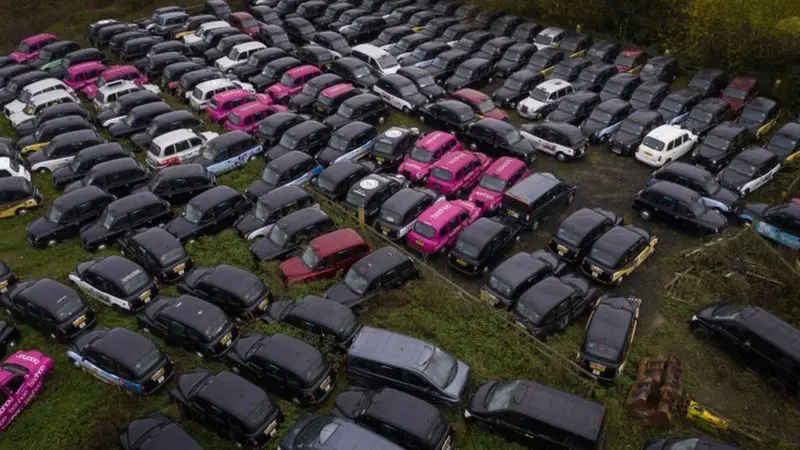Hundreds of unused taxi cabs are being kept in fields as work has come to a screeching halt for drivers.
Transport for London data shows licensed taxis in the capital fell by a fifth from 18,900 in June to 15,000 this month.
Only 20 per cent of cabbies are still driving their vehicles, according to The Licensed Taxi Drivers’ Association.
The group also found taxis at Heathrow Airport waited an average of nine hours before picking up a passenger last month.
North London-based rental company GB Taxi Services has seen the occupation rate of its fleet of 100 black cabs drop from 95% before the crisis to just 10%.
It is one of two firms using an area of farmland in Epping Forest, Essex, to store about 220 unwanted taxis so they can stop paying to insure them.
Another rental firm, Sherbet London, has hired a car park to store 400 cabs, representing two-thirds of its fleet.
Chief executive Asher Moses said: “The whole trade has suffered. There must be 2,000 taxis on fields at the moment.”
TfL said it had provided drivers with “practical advice on a number of issues” during the crisis, and added that black cabs “remain an integral part of the transport network”.
General secretary Steve McNamara said cabbies are earning “starvation wages” around a quarter of normal levels.
Howard Taylor, 60, who has been a cab driver in the capital for more than three decades, said he went to work with “no expectation at all” of being hailed for a ride.
“I’ve never seen London like it. In 33 years I’ve never seen it as quiet, as desolate and depressing.”
London cabbie Andy Biggs, 63, said demand has “evaporated” and he is lucky if he has three customers a day.
“When we first went back after the initial lockdown, things started to get a little bit better very slowly,” he said. “But now it’s as dead as it’s ever been.”
Drivers “are doing desperate things” such as selling their taxis for well below market value to “get through the next few months”, he added.
The pandemic has been a “complete and utter nightmare” for cabbies who have “fallen through the gaps” in the Treasury’s furlough scheme, Mr McNamara said.


